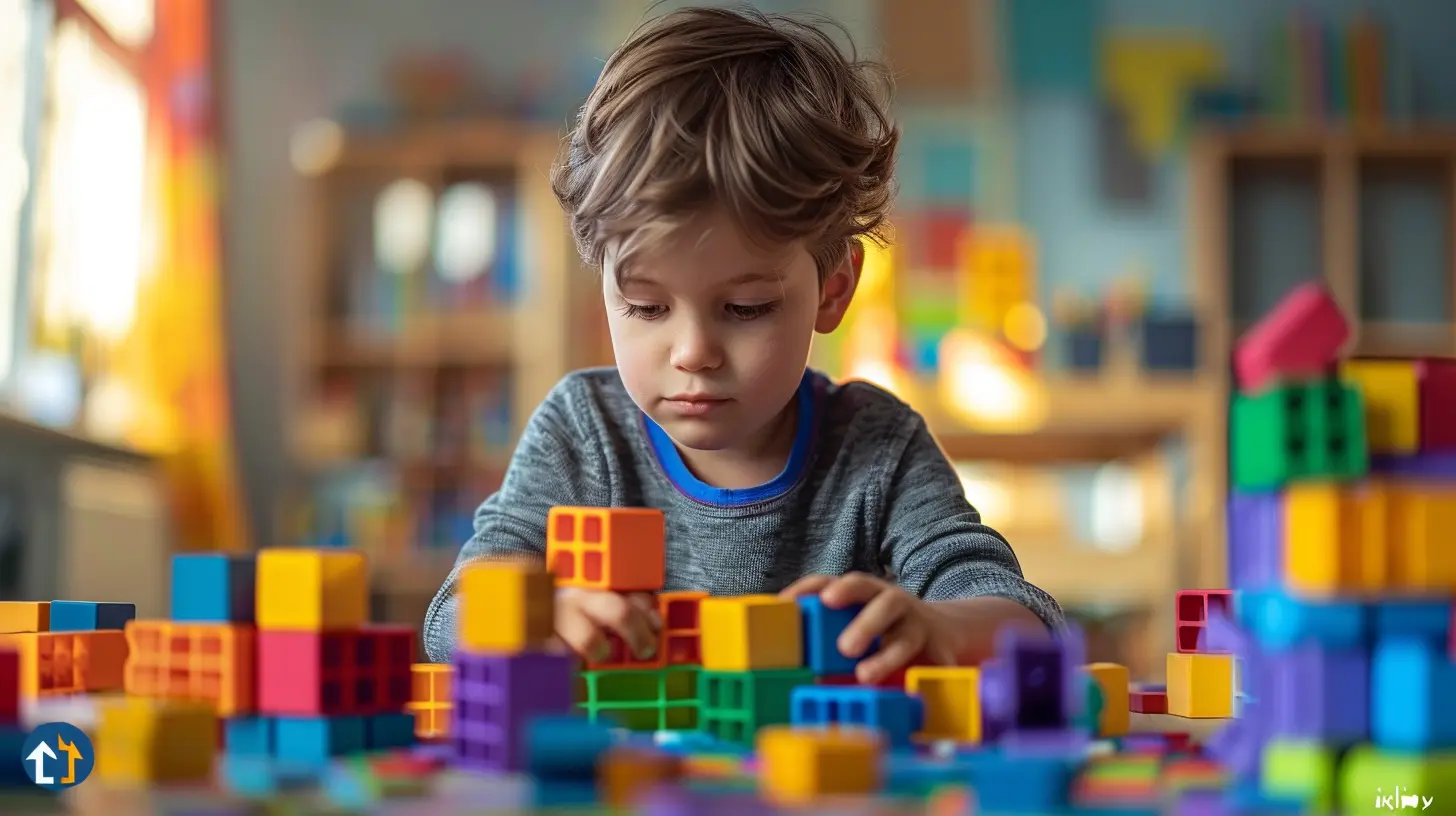The Power of Puzzles: Building Problem-Solving Skills in Math
31 December 2024
Let’s be real — math can be a tricky subject. For many students, it's a battle between frustration and understanding. But what if I told you there's a way to make math not only more enjoyable but also more approachable? Enter: puzzles. Yep, those brain-bending little challenges that seem like fun but are secretly working your mental muscles.
Puzzles are more than just a way to pass the time. They’re a powerful tool in building problem-solving skills, especially when it comes to math. Whether you’re a parent looking to help your child, or a student trying to level up your math game, this article will dive deep into how puzzles can make a big difference.

Why Puzzles Matter in Math
You might be wondering, Why puzzles? Isn’t math already hard enough? Here's the thing: problem-solving isn't just about knowing formulas and steps; it's about thinking critically, recognizing patterns, and applying logic. And guess what? These are exactly the skills puzzles help build!Let’s break it down:
- Critical Thinking: Puzzles force you to think outside the box. They present you with a problem (often in a fun, less intimidating way) and ask you to figure it out. It’s like a mental workout.
- Pattern Recognition: Many math problems revolve around identifying patterns, whether it’s numbers, shapes, or sequences. Puzzles, especially those like Sudoku or number grids, make pattern recognition a game.
- Logical Reasoning: Puzzles often require you to make decisions based on evidence. You have to think, "If I do this, what happens next?" This is the essence of logical reasoning, a crucial part of solving complex math problems.

The Science Behind Puzzles and Math Skills
Let’s take a moment to understand the science behind this. Numerous studies have shown that engaging in puzzle-solving activities helps stimulate the brain's prefrontal cortex — the area responsible for problem-solving and critical thinking. This part of the brain is like the command center for higher-order thinking skills, which are essential for math tasks.When students work on puzzles, they're essentially training their brains to be more adaptable, quicker at processing information, and better at handling abstract concepts. Over time, this positively impacts their ability to tackle math assignments and exams.
Think of it this way: just like lifting weights builds muscle strength, solving puzzles builds mental strength. You wouldn’t walk into a gym expecting immediate results, right? The same goes for math. Working on puzzles regularly can make those tough math problems feel more manageable.

Types of Puzzles That Boost Math Skills
Not all puzzles are created equal when it comes to improving math skills. Some puzzles are specifically designed to hone mathematical abilities, while others contribute indirectly by improving logical thinking and pattern recognition. Here are some of the best types of puzzles for boosting math skills:1. Sudoku
Sudoku is a classic. It’s a grid-based puzzle where you fill in numbers following specific rules. What makes Sudoku great is that it exercises both logic and number sense. You don’t need to know complex math to solve it, but you do need to think critically and recognize patterns.Sudoku teaches you to:
- Focus on eliminating possibilities.
- Spot patterns and relationships between numbers.
- Develop your patience and attention to detail.
2. Logic Puzzles
Logic puzzles are like mental mazes. They present you with a scenario and a set of clues, and you have to figure out the solution. These puzzles are perfect for sharpening your logical reasoning skills, which are essential in math when you're solving equations or word problems.For example, a classic logic puzzle might say: "There are three people, A, B, and C. A always tells the truth, B always lies, and C randomly tells the truth or lies. You ask them a question. Who do you trust?" It’s a fun challenge, but it also teaches you to think logically and critically, just as you would in a math word problem.
3. Tangrams and Geometric Puzzles
Tangrams are puzzles that involve arranging geometric shapes to form a specific image. These puzzles are especially good for improving spatial reasoning, which is crucial for understanding geometry in math.When you work with tangrams:
- You’re developing an intuitive sense of shapes and their properties.
- You improve your ability to visualize solutions, which is hugely helpful in geometry problems.
- You start to understand how different shapes can fit together, much like solving a puzzle on a graph.
4. Word Problems and Math Crosswords
Word problems are essentially puzzles in disguise. They require you to take a real-world scenario, figure out what math operation to use, and then solve it. These types of puzzles force you to think critically, much like the multi-step problems you encounter in math class.Math crosswords take this a step further by combining math operations with word clues. Solving these puzzles requires both a solid grasp of math and language, making them a fantastic brain workout.

How Problem-Solving Skills Translate to Math Success
Here’s the million-dollar question: How do these puzzles actually improve math performance?The answer lies in the skills you’re building while solving puzzles. Let’s break it down:
1. Improved Focus and Patience
Puzzles require you to sit down, concentrate, and see the problem through to the end. The same goes for math. Often, students get frustrated when they can’t solve a math problem immediately. But puzzles teach you that it’s okay to make mistakes and that persistence pays off. This mindset is critical for success in math.2. Enhanced Logical Thinking
Puzzles like Sudoku and logic games train your brain to think logically. In math, particularly in areas like algebra and calculus, you need to apply logical reasoning to solve equations and inequalities. The puzzle-solving skills you develop transfer directly to understanding the step-by-step process of solving math problems.3. Increased Confidence
Let’s be honest — math can be intimidating. Many students struggle with confidence. Puzzles, however, offer a low-stakes way to practice problem-solving. Each time you solve a puzzle, you get that little hit of dopamine — a reward for your brain. This builds up your confidence, which can carry over to math exams and assignments.4. Better Pattern Recognition
A lot of math is about recognizing patterns, whether it’s in sequences, shapes, or numbers. Puzzles train your brain to spot these patterns quickly. For example, recognizing the patterns in a Sudoku grid can help you see the patterns in a math sequence or equation.How to Incorporate Puzzles into Your Math Routine
Now that we know the benefits of puzzles, let’s talk about how to actually incorporate them into your math routine.1. Start Small
You don’t need to dive into complex logic puzzles right away. Start with something simple, like a daily Sudoku puzzle or a basic tangram. The goal is to build up your problem-solving muscles gradually.2. Set Aside Puzzle Time
Just like with any skill, consistency is key. Set aside 10-15 minutes a day for puzzle-solving. You can do this during a break from homework, or even as a warm-up before diving into math problems.3. Mix It Up
Don’t stick to just one type of puzzle. Try a variety. One day, work on a Sudoku puzzle. The next, try a logic puzzle or a geometric tangram. Keeping it varied will keep your brain engaged and help you develop a broader range of problem-solving skills.4. Work with Friends or Family
Puzzles are more fun when you do them with others. Whether it’s a family puzzle night or a friendly competition with classmates, solving puzzles together can make the experience more enjoyable and help you see different perspectives on problem-solving.
Conclusion: The Puzzle Piece to Math Success
The beauty of puzzles is that they’re a fun, low-pressure way to improve your math skills without even realizing it. They help you build critical thinking, pattern recognition, and logical reasoning — all the things that make math easier and less intimidating. So, next time you’re feeling stuck on a math problem, remember: it’s just another puzzle waiting to be solved.Get out there, grab a puzzle, and start training your brain. Who knows? You might even find that math becomes your new favorite subject.
all images in this post were generated using AI tools
Category:
Math SkillsAuthor:

Bethany Hudson
Discussion
rate this article
16 comments
Lincoln McGuire
Who knew that solving crosswords could boost your math skills? Next time you’re stuck on a problem, just remember: puzzles are math’s playful little sidekicks!
March 29, 2025 at 5:19 AM

Bethany Hudson
Absolutely! Puzzles engage critical thinking and strategy, making them excellent tools for enhancing problem-solving skills in math. They truly are playful allies in learning!
Zorion Barlow
Love puzzles! They make math fun!
February 16, 2025 at 9:37 PM

Bethany Hudson
Thank you! I completely agree—puzzles are a fantastic way to engage with math and enhance problem-solving skills!
Vienna Hensley
Great article! I love how puzzles can make learning math fun and engaging. It's amazing to see how they boost problem-solving skills while keeping our minds sharp. Keep sharing!
January 31, 2025 at 7:45 PM

Bethany Hudson
Thank you! I'm glad you enjoyed the article and appreciate the value of puzzles in enhancing problem-solving skills!
Sara McQuillen
Unlocking the hidden layers of math through puzzles, we venture into a realm where logic intertwines with creativity. What secrets lie in the patterns waiting to be discovered?
January 29, 2025 at 4:17 AM

Bethany Hudson
Absolutely! Puzzles not only challenge our problem-solving skills but also reveal the beauty of mathematical patterns, fostering both logic and creativity. It’s in these hidden layers that true understanding emerges.
April Turner
Sure, puzzles build problem-solving skills, but let's be real: they also teach kids how to stay cool under pressure—where's the real math magic?
January 26, 2025 at 7:18 PM

Bethany Hudson
You're right! Puzzles not only enhance problem-solving skills but also foster resilience and composure under pressure—key ingredients in mastering math concepts.
Ember McCarty
I absolutely loved this article! Puzzles are such a fun way to engage with math. They not only make problem-solving skills sharper but also spark creativity. Can't wait to incorporate more puzzles into my teaching—who knew math could be this much fun? Thanks for sharing!
January 21, 2025 at 8:53 PM

Bethany Hudson
Thank you for the kind words! I'm thrilled to hear you're excited about incorporating puzzles into your teaching. They truly can make math enjoyable and enhance problem-solving skills!
Kristen Mercado
Who knew math could be as fun as solving a mystery? Grab your magnifying glass and let's puzzle our way to genius!" 🕵️♂️🔍
January 15, 2025 at 12:26 PM

Bethany Hudson
Absolutely! Puzzles not only make math enjoyable but also sharpen our problem-solving skills. Let's embrace the mystery in learning! 🧩✨
Audra McIntosh
This article beautifully highlights how puzzles can transform math learning. Engaging with challenges not only enhances problem-solving skills but also fosters a love for learning. I'm inspired to incorporate more puzzles into my teaching approach!
January 8, 2025 at 5:26 AM

Bethany Hudson
Thank you for your thoughtful comment! I'm glad to hear you're inspired to integrate puzzles into your teaching—it's a powerful way to spark enthusiasm for math!
Anisa Bass
Who knew puzzles could be the ultimate math sidekick?!
January 4, 2025 at 11:24 AM

Bethany Hudson
Absolutely! Puzzles not only challenge our thinking but also enhance our problem-solving skills in math. They're a fun way to engage with concepts!
Natalia Ortiz
Who knew solving puzzles could make you a math ninja? Forget fancy calculators—give me a jigsaw of numbers and a cup of coffee, and I'll be slicing through problems like a hot knife through butter!
January 4, 2025 at 5:24 AM

Bethany Hudson
Absolutely! Puzzles engage our brains and enhance problem-solving skills, making math both fun and effective. Cheers to coffee-fueled math ninjas!
Colton McTigue
Puzzles enhance critical thinking, making math engaging and fun for students!
January 3, 2025 at 11:48 AM

Bethany Hudson
Thank you! I completely agree—puzzles not only make math more enjoyable but also sharpen critical thinking skills essential for problem-solving.
Mercy Morgan
Great insights on engaging learners!
January 2, 2025 at 12:53 PM

Bethany Hudson
Thank you! I'm glad you found the insights valuable!
Kairoth McGlynn
Embrace the challenge! Puzzles aren’t just child’s play; they’re crucial for honing problem-solving skills in math. By engaging with puzzles, we cultivate critical thinking and creativity. Let’s prioritize these powerful tools in education—because effective learning requires more than rote memorization; it demands innovation and curiosity!
January 2, 2025 at 4:23 AM

Bethany Hudson
Absolutely! Puzzles are essential for fostering critical thinking and creativity in math, making learning both engaging and effective. Let's champion their role in education!
Tala McVey
This article effectively highlights how puzzles can enhance problem-solving skills and foster a love for math.
January 1, 2025 at 9:05 PM

Bethany Hudson
Thank you! I'm glad you found the article insightful. Puzzles truly are a powerful tool for developing both problem-solving skills and a passion for math!
Dominic Hardy
This article effectively highlights the importance of puzzles in enhancing problem-solving skills in math. Engaging with puzzles not only makes learning enjoyable but also fosters critical thinking, creativity, and resilience—key traits for success in both academics and life.
January 1, 2025 at 6:03 AM

Bethany Hudson
Thank you for your thoughtful comment! I'm glad you found the article highlights the valuable role puzzles play in developing essential skills.
Grace McVey
Loved this article! Puzzles are like little workouts for our brains, flexing those problem-solving muscles in such a fun way. Keep embracing the challenge—every twist and turn makes you a stronger math whiz! Let’s keep puzzling our way to success!
December 31, 2024 at 7:47 PM

Bethany Hudson
Thank you! I’m glad you enjoyed the article. Puzzles truly are a fantastic way to strengthen our problem-solving skills. Let's keep puzzling together!
MORE POSTS

The Importance of Lifelong Learning for Educators

Combining Online and Face-to-Face Instruction for Better Results

How to Simulate a Rainforest in a Jar and Study Eco-Systems

Collaborative Learning for Problem-Solving in STEM Education

How to Identify and Support Twice-Exceptional Learners

How to Introduce Sustainable Transportation Concepts in Schools

Teamwork in the Classroom: Strategies for Effective Group Learning

Building a Strong Foundation: The Importance of Early Math Skills

The Role of Speech Therapy in Addressing Learning Disabilities

The Power of Positive Thinking in Student Success